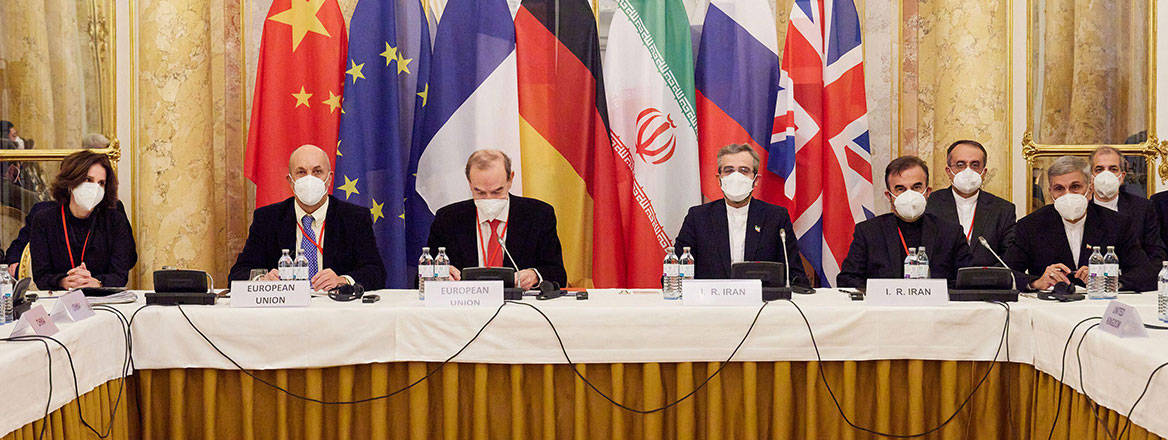Ever since it was signed, Europe has remained firm in its support for the Iran nuclear deal – and the war in Ukraine has only served to reinforce this.
When the Joint Comprehensive Plan of Action (JCPOA) – or the Iran nuclear deal – was first signed in 2015, it was quickly described as the first success in global diplomacy for the EU. The EU’s High Representative for Foreign Affairs and Security Policy has a formal role as the Coordinator of the JCPOA’s Joint Commission, in acknowledgement of the EU doing the diplomatic heavy lifting on negotiating the deal within the P5+1 format, and with Iran. Certainly, there has long been a sense in several European capitals – especially Brussels – that Europeans have a special responsibility to preserve the deal, including by keeping it on life support as former US President Donald Trump withdrew from it. A revived JCPOA now hangs in the balance, but the Europeans are still working towards it. The decision to spend this much political capital on the JCPOA is a sign that the deal is viewed in Europe as being valuable in itself.
Europeans have long been worried that Iran’s expanding nuclear programme posed a major nuclear proliferation risk. After the Russian invasion of Ukraine led Moscow to leverage its nuclear capabilities to contain Western policies in defence of Ukraine, Europeans grew even more convinced that a nuclear-armed Iran must be avoided at all costs. Similarly worrying is the potential contagion effect of a nuclear-armed Iran on other regional powers, which would certainly have pursued equal capabilities, if not for deterrence purposes. That particular risk is even higher today, at a time when traditional deterrence mechanisms are being profoundly questioned, including as a result of the retrenchment of the US from its role as a security guarantor.
While the JCPOA was always going to be an imperfect deal, it did curtail Iran’s nuclear capabilities. According to the International Atomic Energy Agency (IAEA), after the JCPOA, Iran shipped out 98% of its enriched uranium, capped its level of uranium enrichment at 3.67%, removed two-thirds of its installed centrifuges, agreed to convert the Fordow enrichment plant into a research facility, and redesigned the Arak heavy water reactor. The IAEA inspectors, who had reasonably good access to Iran’s nuclear facilities, always maintained that Tehran was compliant with the JCPOA.
Europeans long wanted to avoid a scenario in which the US, Israel or both would launch military strikes on a country of 80 million people situated at the crossroads between Asia and Europe
Additionally, the deal provided a platform to address tensions and threats diplomatically, rather than militarily. Viscerally averse to instability, conflicts and military escalations, the Europeans long wanted to avoid a scenario in which the US, Israel or both would launch military strikes on a country of 80 million people, situated at the crossroads between Asia and Europe. This has become even more relevant after the Taliban takeover of Afghanistan, as a potential Iranian collapse would create an arc of instability linking Afghanistan directly to the Mediterranean via Iraq and Syria. Such an arc could become a smooth transit corridor for crime, jihad and everything in between.
Another reason behind the EU’s defence of the JCPOA has to do with its core belief in the value of preserving a rules-based international system – the operating system of the EU itself – which Europeans view as being under attack from rival powers, such as Russia and China. For Europeans, the opposite of a rules-based international system is anarchy, which inevitably leads to violence and instability. The answer to avoid this, Europeans believe, is to drag potential disruptors and aggressors – Russia and China, but also Iran – into formal rules-based mechanisms though positive incentives. On the contrary, as partially experienced during the deal’s de-activation between 2018 and 2021, the collapse of the JCPOA would push Iran into strategic partnerships with Russia and China, who, unlike the Europeans, can easily operate outside of the rules-based system. For the same reason, the Europeans strongly support follow-on talks on regional de-escalation and arms control, to be held after the JCPOA is signed, and to be grounded in the letter of political commitments.
Finally, Europeans also see an economic value in relations with post-JCPOA Iran. Looking at data compiled by Eurostat for the 24-month period following sanctions relief in 2016, monthly EU exports to Iran rose 47%, while EU imports from Iran shot up 560%, driven by the purchase of Iranian mineral oils, including crude oil. At the time, European companies were keenly aware of the opportunities presented by sanctions relief, given the size of the Iranian market, and moved proactively to work on investment deals in various sectors including energy, manufacturing, the chemical and pharmaceutical industries, and infrastructure.
The Russian invasion of Ukraine has strengthened European voices who have been encouraging the EU and its member states to look to Iran as a potential partner for its energy needs
Fast forward to 2022, and European firms and investors who lost capital and opportunities as a result of US secondary and snap-back sanctions under Trump will be generally more hesitant to engage with Iran. However, the energy dimension will be more acutely relevant than in 2016. The Russian invasion of Ukraine has had a severe impact on EU energy security and led Europeans to the irreversible decision of diversifying away from their reliance on Russian oil and gas. Other oil and gas producers, especially rivals of Iran in the Gulf, have been hesitant to step up production and support European energy security. This has strengthened the European voices who have been encouraging the EU and its member states to look to Iran as a potential partner, alongside others, to achieve energy security and a more stable energy market. European firms who have had to withdraw their investments from the Russian energy sector will be seriously considering redirecting such capital to Iran, in order to speed up the much-needed renovation of Tehran’s energy industry.
For all of these reasons, Europeans remain keen on keeping the JCPOA negotiations alive, despite the many hurdles faced. Indeed, should the negotiations definitively collapse, Europeans would still not forego these priorities, especially on the energy front, and would re-position accordingly.
The views expressed in this Commentary are the author’s, and do not represent those of RUSI or any other institution.
Have an idea for a Commentary you’d like to write for us? Send a short pitch to commentaries@rusi.org and we’ll get back to you if it fits into our research interests. Full guidelines for contributors can be found here.
WRITTEN BY
Cinzia Bianco
- Jim McLeanMedia Relations Manager+44 (0)7917 373 069JimMc@rusi.org


